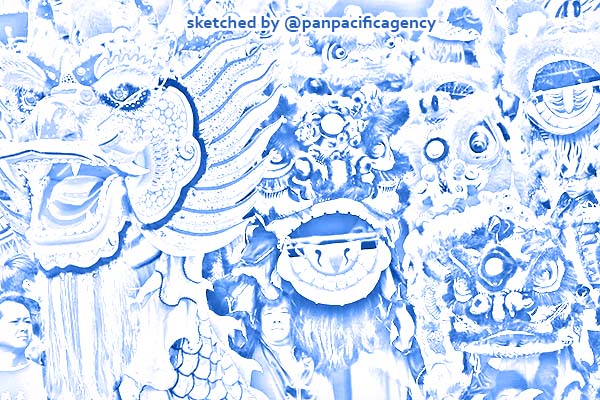China halts stock trading in extended holiday as deadly virus outbreak spreads, sends country into lockdown

The ceremony marking the Lunar New Year, which includes a lion dance, will not be held for the first time in the Hong Kong exchange’s two-decade history. Photo: David Wong. Sketched by the Pan Pacific Agency.
BEIJING, Jan 27, 2020, SCMP. China’s financial regulators will suspend trading on the Shanghai and Shenzhen stock exchanges in an extended halt of one of Asia’s largest capital markets following a deadly viral outbreak, South China Morning Post reported.
The Shanghai stock market, which has been shut since January 23, will resume trading on February 3, in keeping with an extended Lunar New Year public holiday ordered by the State Council. A source familiar with the matter confirmed that China Securities Regulatory Commission (CSRC), the country’s top securities regulator, will halt trading for the duration of the holiday.
The smaller Shenzhen exchange in southern China will observe a similar suspension, the source added. Hong Kong’s stock exchange, which lies outside the purview of the CSRC, will resume trading on January 29.
A Shanghai Stock Exchange spokesman said there was no official information on until when the break in stock trading will be extended to.
The State Council, China’s chief administrative authority, on Monday extended the holiday by another two working days, until February 2.
The Hong Kong stock exchange, meanwhile, said it would cancel a ceremony to mark the first trading day of the Year of the Rat, because of the increasing risk the Wuhan coronavirus outbreak poses.
In an emailed statement on Monday, bourse operator Hong Kong Exchanges and Clearing (HKEX) said the stocks and futures markets will open and operate as usual. “Our decision is based on the increasing risk of coronavirus infection in Hong Kong, and knowing that the health and safety of our guests and colleagues remain our highest priority,” it said. The ceremony, which includes a lion dance, will not be held for the first time ever in the exchange’s two-decade history.
The decision to extend the holiday was taken to “strengthen the prevention and control of the pneumonia epidemic of the new coronavirus infection, effectively reduce the gathering of people, block the spread of the epidemic and better protect the lives and health of people”, the State Council said in a note.
Meanwhile, on Sunday the China Banking and Insurance Regulatory Commission (CBIRC) said the banking and insurance industries should temporarily suspend or adjust business hours as they see fit according to the local severity of the virus epidemic, and encourage the availability of online services as necessary.
The regulator also said banking and insurance companies must allow those affected by the epidemic, who might have temporarily lost sources of income, to delay mortgage repayments, or adjust credit policies to repay loans. Customers claiming insurance over infection from the virus are to be given priority service, and the scope of liability should be extended to give full compensation, the CBIRC said.
Companies in affected industries such as tourism and transport should be offered lower interest rates on loans, the regulator added.
During the 2003 Sars (severe acute respiratory syndrome) epidemic, the CSRC extended the May Day public holiday and closed the stocks and futures markets until May 12, postponing trading for four additional days. The stock exchanges in Shanghai and Shenzhen were originally expected to have a trading break between May 1 and 5.
The current outbreak has brought back memories of Sars, which afflicted 8,098 people in 37 countries and killed 299 people in Hong Kong.
During that outbreak, property prices in the city fell 9 per cent and transactions in the secondary property market fell by a whooping 67 per cent, according to the Centra-City Leading Index. It led to a bigger drop in property prices and transaction volumes as Hong Kong’s economy “had been weakened since the 1998 Asian financial crisis and the unemployment rate was high at the time”, said Sammy Po Siu-ming, chief executive of Midland Realty’s residential division.
Moreover, Sars occurred during spring, which is not a busy holiday time and did not affect tourism as much. The current outbreak has, however, already disrupted the busy Lunar New Year holiday, and will continue to have an impact on transport, tourism as well as the retail sectors. The crisis is still unfolding and has claimed 80 lives so far.